Union POWs in Confederate Prisons: Highlights from The American Civil War Collection, 1860-1922
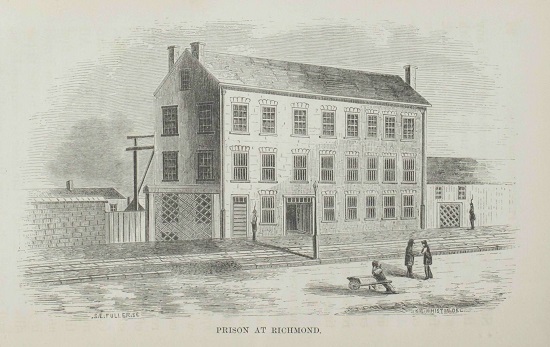
The latest release of imprints from The American Civil War Collection, 1860-1922: From the American Antiquarian Society includes several accounts by Union soldiers who were prisoners of war in Confederate prisons.
Prison-life in the Tobacco Warehouse at Richmond by a Ball's Bluff Prisoner, Lieut. Wm. C. Harris, of Col. Baker's California Regiment (1862)
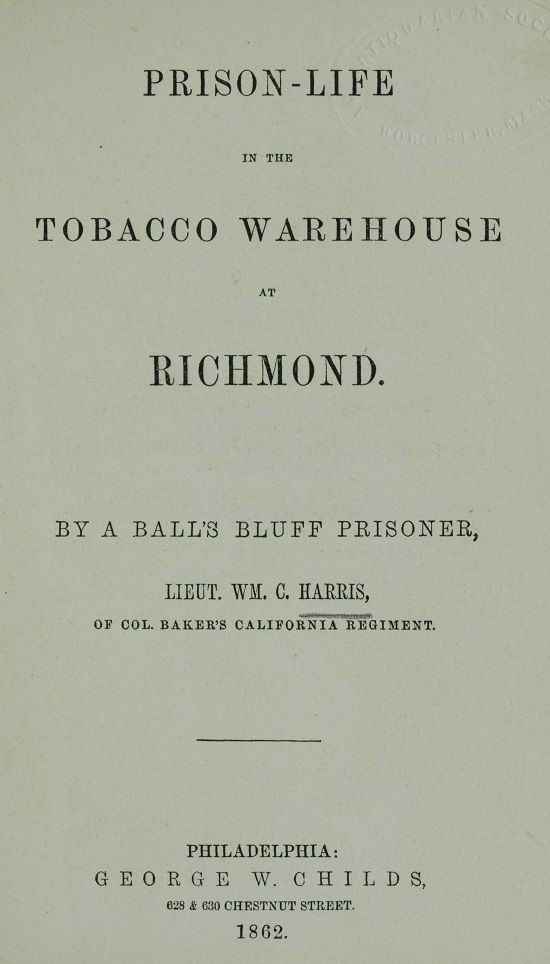
In an earlier release from this collection we featured a walking tour of Richmond, Virginia, during which the narrator observes the prison that had been converted from a tobacco warehouse. This imprint describes life inside that prison. Prisoner Harris gives us his personal recollections and dedicates his reflections:
To my Brother-Prisoners in Richmond these sketches are affectionately inscribed by the author
In his preface the author states his intention:
These sketches were written to lessen the tedium of my lengthy imprisonment; and if they serve to recall to my prison-companions the scenes enacted in the old Warehouse, and enlist the interest and sympathies of the reader, they will have accomplished all that is desired by the publication of them.
With the exception of “Homeward Bound,” they were all written within the prison-walls, brought North sewn securely in the lining of an overcoat.
I confidently trust to my brother-officers for their testimony as to the fidelity of description of our “domestic economy,” and the accuracy of detail in the varied incidents of our prison-life in the Tobacco Warehouse.
One constant theme in Harris’s account is the extent to which the prisoners of war were put on display for the entertainment of the inhabitants of Richmond which began upon their arrival in the renegade capitol city.
We found the depot and adjacent streets thronged with a dense mass of people. Men, women, and children were huddled together, each individual straining every nerve to obtain a sight of us. Looking from the car-windows, we beheld a tumultuous herd swaying to and fro, every eye fixed upon the cars, and, as one of us leaned forward to catch a glimpse of the scene, a hundred fingers would be pointed, and voices heard yelling, “There is one! See! There’s a Yank!”
Throughout their imprisonment the soldiers were put on display to be gawked at and vilified.
Visitors of all grades were allowed to enter the building, and often subjected to them, in the presence of Confederate officers of the prison, to the vilest abuse. Outside of the warehouse, the square was for weeks packed with Rebels, who, whenever they caught a glimpse of a Federal officer, hooted at and insulted him. Richmond had, apparently, given up her rabble and filth to centre around the “Yankee” prisons,—as men, women, and even little children scarcely old enough to walk, united in heaping scurrilous abuse upon them.
Despite all of the indignities of his situation, including vermin, deprivation, disease and death, Harris evinces a sense of the absurd and the talent to describe it. One constant in the life of the prisoners was the ever-changing rotation of commandants and the consequent rigidity or laxness with which prison life was ordered.
Previous to the advent of the new commandant, we habitually slumbered in the morning until eight or nine o’clock, as a resource to shorten the drear tediousness of the day; but alas! on the 22d of January our realm of slumber was invaded, and we were aroused shortly after daybreak, and summoned to attend roll-call by the officer of the day surnamed “Yankee-Killer,” accompanied by a file of Confederate soldiers.
The astonishment with which the dreamy, half-recumbent sleepers received the call, the husky, inquiring voices, the reluctant, drowsy lassitude evinced by all, gave evidence of the unwelcome nature of the order. With slow and intentionally lazy movements we prepared to obey; each garment was handled with a studied yet demure awkwardness; boots were put on the wrong foot, legs were reversed in pantaloons, and coats manoeuvred [sic] to change front to rear.
Amongst the exposure to privation and vituperated exhibition, the men found ways to be creative and inventive.
During the suffering and destitution the men daily experienced,—suffering calculated to deaden every energy of life, and render turbid the natural buoyant impulses of man’s nature,—the Federal privates had resources within themselves to soften the rigor of their confinement.
Often did we hear their fine glee-club blending voices in the notes of our national songs, whilst “Home, Sweet Home” would come trilling to our ears through the plank ceiling above us.
Theatrical amusements and working in bone and wood served to lessen the tedium of imprisonment.
Specimens of their skill in producing from bone trinkets of beautiful workmanship were bought with avidity by the Confederate and their own officers. Finger-rings of exquisite and unique chasing, Maltese crosses of elaborate finish, and curious national emblems of quaint design, portraying the skill whilst suggesting the patriotism of the carver, cut from bone and carved with the rudest tools,—jack-knife and file,—were the results of the constant employment of the men.
Harris variously describes his fellow prisoners as they cluster according to rank and prestige. One such prisoner was the Congressman Alfred Ely of New York who had been captured at Bull Run when observing the battle.
Looking straight before us, we see Congressman Ely bending over his “mess-table,” seemingly buried in the mass of documents around him. Every day, for hours, he is occupied with his pen, assisted by young Hale, of the Navy (nephew to Gideon Welles, Secretary of the Navy,) who has volunteered as his secretary.
The next imprint we discuss is Mr. Ely’s own account of his imprisonment.
As previously noted, Harris’s narrative weaves between pathos and humor, despair and celebration. Perhaps the most affecting anecdote describes the Christmas celebration among the prisoners. After an evening of happy anticipation…
The morning opened with sixty voices greeting, “A happy Christmas!” and bright faces and glad voices seemed to illumine the old walls, for they looked less chilling, and gave back our shouts with a clearer tone than ever before…
Many officers invited to their Christmas-dinner a non-commissioned officer of their company; and as we sat around the mess-table, covered with tin crockery and steaming with our costly meal, we presented a perfect picture of democratic luxury.

Journal of Alfred Ely, a Prisoner of War in Richmond. Edited by Charles Lanman (1862)
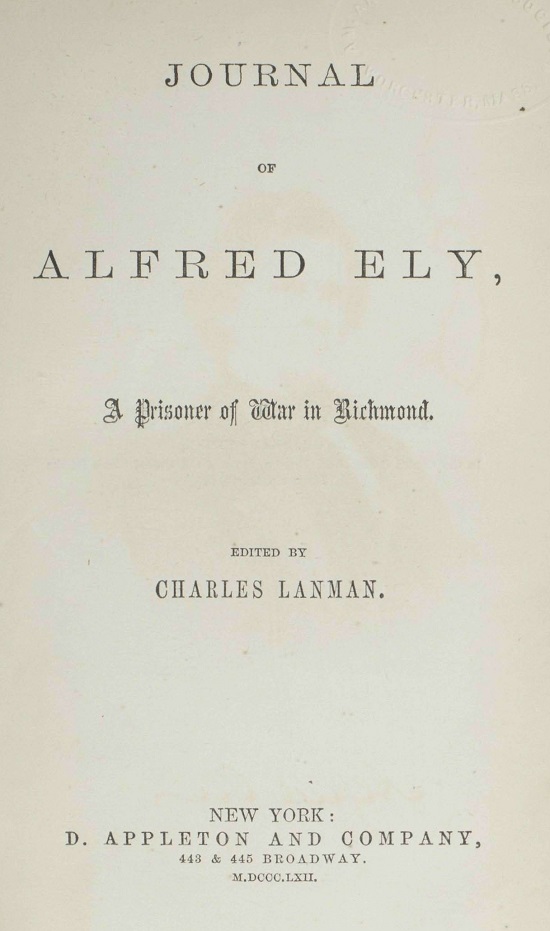
The preface describes Ely’s visit to observe the first battle of Bull Run and his capture.
In company with many of our gallant officers and men, who had the misfortune to be captured on that occasion, some of whom bore honorable wounds, he was carried to the head-quarters of the rebel general, thence transported to Richmond, and there confined in a prison for five weary months. During that time he saw much to interest his feelings in behalf of his brave and patriotic associates, and not a little to illustrate the character of the people under whose control it was their misfortune to be thrown.
Ely encounters much the same behavior from his captors as did Harris. Some were courteous while others seethed with hostility.
One of the officers, a captain, immediately seized me by the arm, and said that I was their prisoner, and took from me the pistol which I had that morning borrowed of Mr. Seth Green. He took nothing else. The officer repeatedly assured me that I should not be harmed, and behaved with kindness and courtesy. He took me to the colonel, sitting on horseback, and introduced me in these words: “Colonel, this is Mr. Ely, Representative in Congress from New York,” to which the colonel, in a most angry tone, replied, drawing his pistol, and pointing it directly at my head, “G-d d—n your white-livered soul! I’ll blow your brains out on the spot.”
Much like Harris, Ely experiences being an object of curiosity:
It was evident from the crowds of people who gathered around the train at every station, and from the appearance of the inhabitants in front of farm-houses and along the road, that the prisoners of war were expected to pass, and a sort of wild curiosity was manifested to get a peep at the “Yankees” through the car windows.
It is interesting to read this and the previous imprint in tandem. As an instance, both provide the reader with a similar description of the prison quarters for officers and for enlisted men. Both make clear that they had certain privileges not usually available for most. Both make note of the visit to the prison by Robert Tyler, “the son of the late President…”
Both men were relatively privileged prisoners, but neither was unmindful of the conditions which generally prevailed. However, Ely makes a singular lament:
July 26.—I slept soundly last night, and woke only once from a dream of my wife and children, and the disappointment in not seeing them for a time overcame my feelings. The world and all its honors would have been too little to give at the moment for the sight, even, of my beloved home and family. But, alas! I am a prisoner of war, and that, too, in my own native land! Within these walls I am the victim of an unhappy civil discord in the nation of American freemen, the happiest, freest, and most prosperous people on earth. How much time have I spent, how many celebrations attended, and orations delivered upon the anniversaries of American independence; and where, now, is our boasted Union? Shall the inspiring sentiment of Webster, “Liberty and Union, one and inseparable, now and forever,” no longer be the patriotic watchword of American youth?”
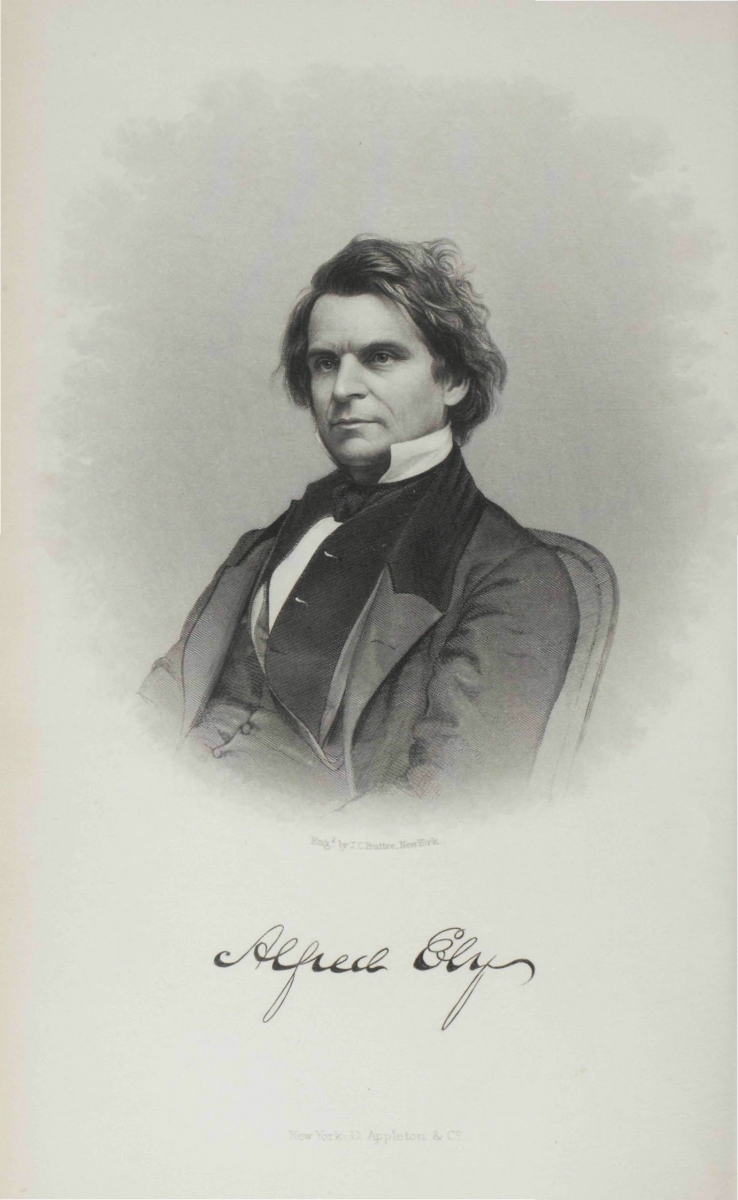
The Barbarities of the Rebels: As Shown in their Cruelty to the Federal Wounded and Prisoners; in their Outrages upon Union Men; in the Murder of Negroes, and in their Unmanly Conduct throughout the Rebellion. (1863)

The author is purported to be Colonel Percy Howard, Late of the Royal Horse Guards, but was actually John Russell Bartlett, the Secretary of State for Rhode Island at the time of the Civil War. Possibly, Bartlett chose this nom de guerre because of the Union’s concern that Great Britain was sympathetic, largely for economic reasons, with the Confederacy. Perhaps, to have a seasoned member of the vaunted Horse Guards describe the alleged horrors of the treatment of Union prisoners by the Confederacy would serve to disgust the British public sufficiently to contain their sympathies. Certainly, his preface pulls no punches:
The compiler of this pamphlet, who has seen much military service in the wars of Asia and Europe, has, in common with the friends of humanity and civilization throughout the world, watched with the deepest interest the progress of the American rebellion. He, too, alike with all who hear and read of the progress of events in this unnatural war, has been shocked with the barbarities with which the war has been conducted by the South; barbarities which no war of ancient or modern times has exhibited, and which the savages of America, Africa, or Polynesia never approached. These cruelties, inflicted by the Confederates upon Federal prisoners, upon Union men who would not uphold treason, and upon inoffensive negroes, ought to be made known, particularly to those in Great Britain who sympathize with the rebellious States…
While both Harris and Ely present somewhat balanced views of their captivity and include light-hearted memories as well as descriptions of bad treatment, Bartlett [Howard] is relentless in presenting his catalogue of outrageous treatment of Union POWs by their Confederate prisoners. One need only read the Table of Contents to understand the purpose of this publication. Some excerpts from the contents:
Barbarities of the Texans
Depreciation of Confederate Currency Punishable with Death
Hanging Union Men in Kentucky
Hanging Union Men in Tennessee
Murder of Negro Waiters and Cooks upon Union Steamboats
Cruelties of Southern Women
The Horrors of Southern Institutions
A Southern Woman Desires to Dance in the Blood of a Union Soldier
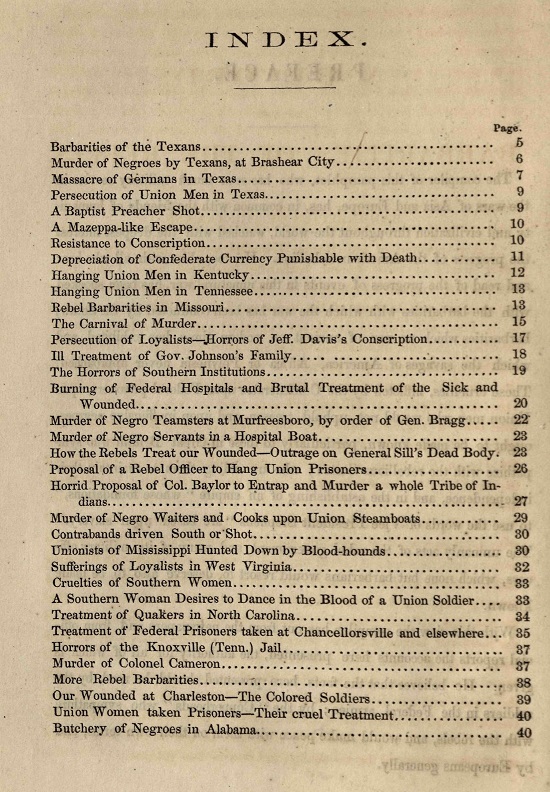
For more information about The American Civil War Collection, 1860-1922, please contact Readex Marketing.



